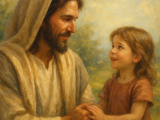The Intersection of Faith and Security in Uncertain Times


In an era marked by global tumult and unpredictability, the role of personal faith in providing protection against harm—be it through human malevolence or natural disasters—has become a subject of profound contemplation and diverse interpretations. The Hebrew Roots movement, which seeks a direct connection to the faith and practices of the first-century assembly, often grapples with understanding how righteousness influences one’s security in the “last days.”
The Theological Perspective
The Scriptures, both Tanakh and New Testament, offer insights into the relationship between faithfulness and divine safeguarding. The Psalmist declares, “He who dwells in the secret place of the Most High shall abide under the shadow of the Almighty” (Psalm 91:1), suggesting a form of spiritual asylum for the believer. Yet, is this a literal physical protection?
The biblical narrative does not unilaterally endorse the notion that righteousness equates to physical invulnerability. The story of Job is a poignant reminder that suffering and calamity can befall anyone, regardless of their piety. Similarly, the New Testament does not shy away from the reality of persecution; Yeshua Himself warns of tribulation, even as He assures His peace (John 16:33).
Historical and Real-World Observations
History is replete with instances where the righteous have faced persecution. The early believers, despite their adherence to the teachings of Yeshua, were not strangers to suffering. The Apostle Paul speaks candidly about the trials and tribulations that accompany a life committed to Messiah (2 Corinthians 11:23-27).
In our contemporary world, it is an observable fact that natural disasters and human violence do not discriminate based on one’s moral compass. Hurricanes, earthquakes, and conflicts affect people across all walks of life, challenging the idea that good behavior alone can safeguard one from such events.
The Social Dimension of Righteous Living
While individual protection is not guaranteed, there is a social dimension to consider. Communities built on the principles of love, justice, and compassion—tenets deeply embedded in the fabric of the Hebrew Roots teachings—often foster environments where mutual support and care can enhance communal resilience. This form of “protection” is more about social cohesion and less about divine intervention.
Spiritual Endurance versus Physical Safety
In the Hebraic mindset, the emphasis is often on spiritual endurance. The Feast of Tabernacles, or Sukkot, commemorates the Israelites’ reliance on Yehovah during their wilderness journey—a time when their faith did not exempt them from hardship but provided them with the strength to persevere. Thus, the believer is equipped not with a shield against harm but with the fortitude to endure and find peace amidst tribulation.
Conclusion: The Role of Faith in the Believer’s Life
Faith, particularly within the context of the Hebrew Roots movement, is a complex tapestry woven with threads of trust, obedience, and the quest for divine truth. It instills resilience and offers spiritual solace. Yet, it does not serve as a talisman against the physical dangers of the world. Believers are encouraged to find solace in the spiritual peace and inner strength that faith provides, while also recognizing the realities of the human condition.
In these “last days,” the call is not to expect a bubble of safety but to walk in the assurance that, regardless of what transpires, one’s faith is the bedrock of hope and the anchor in life’s storms. As stated in Romans 8:38-39, neither death nor life, nor any form of calamity, can separate us from the love of Yeshua. It is this love that remains the believer’s ultimate safeguard—an assurance of spiritual, not necessarily physical, security.










